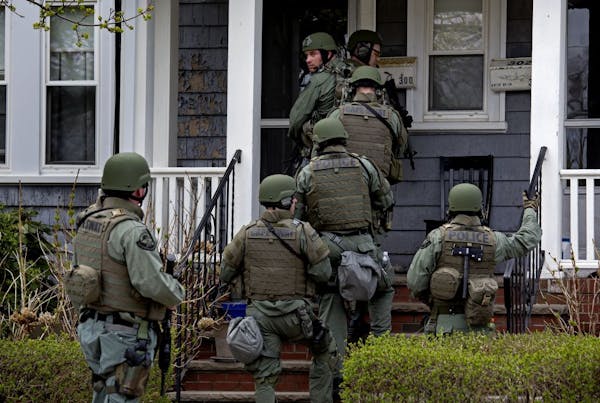As the postgame analysis on the Boston bombings grinds on, a conventional wisdom is starting to take shape based on the heated claims of pundits, officials and security experts, as well as the post-9/11 liturgy on terrorist theory.
It goes something like this: Terrorists are highly intelligent foes who wield violence strategically, bringing immediate and significant attention to their political ends relative to their limited means.
Indeed, ever since the publication of the 9/11 Commission report, it seems that most analysts reflexively default to the official position that contemporary terrorists are "sophisticated, patient, disciplined, and lethal."
Most academics of terrorist theory have since poured concrete on this foundational thesis. Political scientist David Lake of the University of California, San Diego, for example, thinks that terrorists are "rational and strategic," while political scientists Andrew Kydd and Barbara Walter likewise argue they are "surprisingly successful in their aims."
But let's get one thing straight: The Tsarnaev brothers, wherever they may have learned to make bombs or hate Americans, were no geniuses.
In recent years, terrorists targeting the American homeland have been neither sophisticated nor masterminds, but incompetent fools.
In December 2009, Umar Farouk Abdulmutallab failed to bring down Northwest Airlines Flight 253 en route to Detroit when the explosives in his underwear refused to ignite. He succeeded only in burning his pants and promptly getting arrested.
Shortly after, Faisal Shahzad, despite extensive training in the camps of Waziristan, managed only to ruin the interior of his SUV in Times Square.
And let's not forget Rezwan Ferdaus, with the brilliant plan to fly a small, remote-controlled, bomb-laden airplane into the Pentagon and U.S. Capitol, a plan so harebrained that the only explosives he managed to acquire were fake — and presented to him, handcuffs included, by undercover FBI agents.
About 20 Muslim Americans per year since 9/11 have been arrested for planning terrorist crimes, with the vast majority nabbed before engaging in any violence at all. As Daniel Byman and C. Christine Fair have critically noted, "The perception wrongly persists that our enemies are savvy and sophisticated killers."
Yes, the Tsarnaev brothers allegedly managed to kill several people, wound scores, and instill fear throughout Boston. But this has less to do with their terrorism chops than the ease of wreaking havoc in a democracy.
Details of the tragedy remain sketchy, but evidence indicates that Tamerlan and Dzhokhar Tsarnaev aimed to launch a series of mass-casualty attacks after the initial marathon bombing. Masterminds probably would have had an escape plan or some cash on hand.
Here's a few pro tips: Don't mingle with people who have license plates supporting terrorism affixed to their cars; don't post pro-Islamist sentiments on public websites; don't brag to innocents about being responsible for the bombing, and don't run over your brother with a car.
This was amateur hour: After apparently flattening his older brother accidentally, Dzhokhar reportedly placed a pistol in his mouth and tried to kill himself. Once again, he failed. As John Mueller and Mark Stewart point out in Slate, such stupidity is "quite typical" of recent terrorists targeting the U.S. homeland.
Not all terrorists are feckless. The Irish Republican Army, for instance, prided itself on the caliber of its members, picking only the finest recruits to ensure the organization's viability. The Al-Qaida leadership used to do the same, vetting and training the best and the brightest in the world of terrorism, from Mohamed Atta to his 9/11 co-conspirators. But something important changed.
The United States started killing these guys. From the battle of Tora Bora in 2001 to the killing of Osama bin Laden in 2011 to the ongoing drone war, the decapitation campaign has resulted in serious attrition, granting unprecedented tactical autonomy to less strategic lower-level terrorists.
Before, Al-Qaida leaders carefully selected operatives from tens of thousands of jihadists in Afghan training camps. Today, Inspire magazine and other online outlets appeal for anyone at all to commit violence against the infidels. The remaining leadership no longer even attempts to separate the wheat from the chaff. Al-Qaida has an open-door policy, praying for disgruntled people like Tamerlan and Dzhokhar to fashion bombs from leftovers in their mother's kitchen.
The decentralization of America's terrorist enemies is usually seen as advantageous for them. Decentralization is thought to unleash the human potential of militants, making their groups more flexible, innovative, resilient and specialized. Decentralization is said to confer a bounty of strategic advantages on terrorists by rendering them harder to anticipate, detect, infiltrate, and dismantle or kill.
Yet decentralization also carries costs to terrorists by eroding their quality as they move farther away from the leadership. This is because the leaders of terrorist groups, like in many other organizations, have a better sense of what they're doing than the freshest hires.
From what we know now, the alleged Boston bombers weren't even lone wolves. They were, in the grand scheme and historical sweep of terrorism, just puppies. If they were even just a bit smarter, many more innocent Americans might be dead.
That doesn't mean America's national-security agencies can take their eye of the ball. But let's not rush to accord these two alleged terrorists any more IQ points than they deserve.
-------------------
Max Abrahms is a fellow in the political science department at Johns Hopkins University, where he teaches courses on terrorism and international-relations theory.
Aid votes show Congress can still work
Readers Write: Cellphones in schools, potholes, child abuse, good journalism


